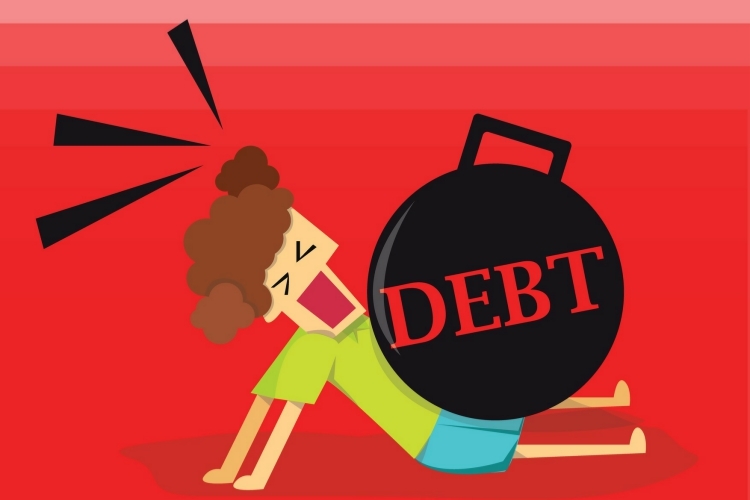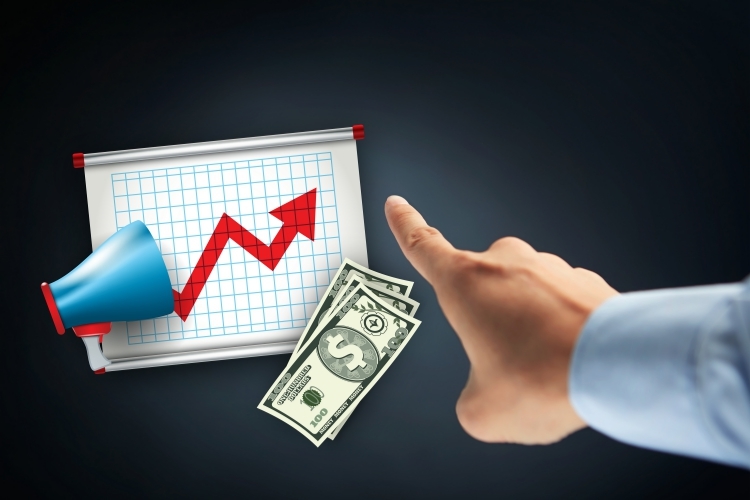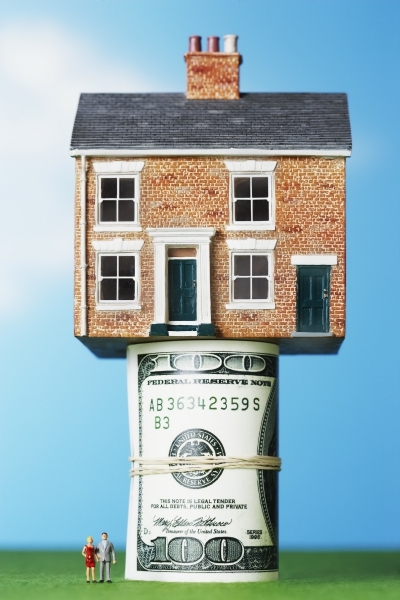Get Out of Debt Before Investing
With the exception of a mortgage, you should get out of debt before investing. Loans types other than mortgages detract from your investing returns.
Within this article, I will refer to debt as credit card debt, car loans, and personal loans. Because mortgage rates are low enough, it's possible to carry a mortgage while investing, and sometimes it's advantageous to do so. Therefore, unless otherwise specified, mortgage debt is not included in this discussion.
Debt Drags Investing Returns Into Negative Territory
Historically, the stock market has given returns of around 10 to 11 percent. However, when you account for inflation, the amount will be closer to 7 to 8 percent. Even if you want to use 10% returns as a frame of reference, the rate for your debt should not exceed the portfolio return rate of ten percent. It shouldn't even match that rate due to the risk associated with the stock market. You'll want a margin of safety.

For instance, if you obtained a car loan at 10% what happens if your portfolio returns only 5%? You need a few percentage points of returns over the debt rate to counteract the risks associated with the market. Given the above, you would want the returns for your investments to be at least 12% or more.
Car Loans
In today's low-rate environment, consumers with good credit can expect car rate offerings to be in the vicinity of 5%. This depends on the type of car you buy (new or used) and the length of the loan. Car loans are on the margin for the decision on whether to pay off before investing. It will depend largely on the amount of money you take home each month. If you have a $300 car payment and you earn $7,000 per month after taxes, you probably can afford to invest. However, if you only bring in $2,500 per month, the $300 car payment will have a bigger impact on your finances, all equal.
In either case, it also depends on your spending requirements each month. You can bring home $7,000 per month and have a $5,000 mortgage payment. You can also make $2,500 per month and have already paid off your mortgage. Each scenario will be different and you have to weigh all factors before deciding.
Credit Card Debt
This is by far the worst type of debt to have. Some people are lucky enough to obtain a decent rate for their credit cards. However, these low-rate deals often come with strings attached. For instance, deferred interest credit cards assume you'll pay off the entire balance by a predetermined date, and if you don't you get hit with much higher rate that is prorated from when you got into debt with the card. The credit card companies entice people with low (or even zero) interest. Some people pay off in full by the date. Many others however, cannot make the payment and get hit with oppressive interest rates. Credit card companies depend on people not paying. That's how they make their money.

For standard credit card rates (without gimmicks of low interest), you can expect a starting rate of about 15%. Many cards are much higher than this, however. Again, the credit card companies depend on people running up large debts which means these debtors will be forced to pay the companies a monthly interest rate.
Unlike car loans, there aren't too many scenarios where it makes sense to invest while tethered with a credit card payment. The risks associated with the investments are too great to take the chance. You are much better off taking what you would have invested to pay down the credit debt.
Exception: Investments in 401K Plans
If your company offers a 401K or some other matching program, it pays to take advantage of this, even if you have debt. The amount of debt will dictate how much you should be contributing. But, matching programs from companies are free money. Even with this great program, paying off your debt allows you to put more money into a 401K which increases the amount your company will match. There is a limit, obviously. But, remember, this money is typically tax deferred whereas regular investments are not.
Expectation Management
Newcomers to the investment arena believe they can do better than historical averages. They get caught up in the hype given by the financial spin doctors and think they'll be the next great investor that everyone will swoon over. These newbie investors learn the hard way that this kind of thinking is a recipe for losing most or all their money.

Some people get lucky and make big gains early on which adds to the hype. These investors are portrayed as market-beating gurus. However, their gains are usually short-lived. Even for a select few who may continue their luck, the average person should not expect to repeat these high flyers.
You can find several stories from days past of the dot-com millionaires.
Unfortunately, many of these dot-com high-fliers are nowhere to be found today. Most thought the party would continue forever. They were wrong. Any company that has sky high valuations are going to come back to earth eventually.
What does expectation management have to do with investing while in debt? If you set your expectations too high, you'll likely believe that you can use the exceptional returns to service your debt. However, investors who don't meet those expectations will be much worse off.
Example of How Paying Off Debt Helps
Suppose you have $24,000 and are $12,000 in credit card debt. The rate for your credit card is 18%. To keep this example simple let's assume simple interest rates and not factor in compounding. Let's also assume you gain 11% on your investments for that same year (again, no compounding).

You will need to make payments to service the credit card debt. Therefore, you decide to only invest half of your cash holdings. Here is the result from this scenario:
Credit Card Debt -> $12,000 at 18% = $14,160, interest = $2,160.
Investment -> $12,000 at 11% = $13,320, gain = $1,320.
You would have $840 more in interest charges than you would have made in the stock market ($2,160 - $1,320). This means that when you paid off the credit card at the end of the investment period, you wouldn't have enough from the gains you made from your investments. You would have a shortfall of $840.
Again, this is a simplistic example as you may have paid down the credit card debt each month from the $12,000 instead of waiting until the end of the investment period. But, imagine if you paid off the credit card debt before investing. You would have earned $1,320 free and clear (before taxes of course). That interest payment of $2,160 would not have dragged down your gains into negative territory.
You could argue that you could have invested the full $24,000 at 11%.You would have an ending balance of $26,640. This is a gain of $2,640. But, you'd still have the $2,160 in interest payments to contend with. That means your gain is only $2,640 - $2,160 = $480.
You are also assuming that the market went your way. What if you only earned 5%? You're back in negative territory when you don't pay off the credit card. If you paid the $12,000 balance of your credit card and invested the remaining $12,000 at 5%, you would still have a gain of $600. That is significantly better than being in negative territory in my book!
Beware of Advice to Take a New Mortgage After Paying Original Off
You may get to a point where you pay off your mortgage completely. If you have a financial adviser, he or she may suggest taking out another mortgage for the purpose of investing that money. He or she argues that a mortgage is the lowest interest most people can obtain (which is true). Why not use it to your advantage? The thinking is in thirty years when the new mortgage is paid off, you'll have a tidy sum waiting in your investment account.
There are merits to this strategy and I am not trying to knock financial advisers. But, there are pitfalls as well. Just make sure you understand what you are getting into before you agree to this. I have written a post that covers the concept in detail. I would encourage you to read it before taking the plunge.

Investing with No Debt Is Ideal, But Not Practical
If you paid off all your debts, you could use whatever money you earn to invest and grow that money, unencumbered by debt payments. Even at four or five percent returns over time, your returns would be respectable. However, it's difficult to manage in today's society without some amount of debt. Most people don't have cash to pay a car in full. The same goes for a house.
You should try to pay down as much debt as possible and any debt that remains should be as low cost as possible. Try to find the lowest rates and refinance when it makes sense to do so. If you need to find ways to consolidate your debts, take advantage of that. It's a balance. But, you need to reevaluate your financial situation frequently to see when it makes sense to invest, even if you carry some debt.
Conclusion
This article does not touch upon getting out debt. That's a complicated topic that could take up several articles. However, the key is to spend less and try to make more money. The spending less aspect you'll have to figure out on your own. But, increasing your income is something that this website helps people do.
One great way to increase your income is to start an online business. But, unless you know what you are doing, you'll end up spending too much money and doing all the wrong tasks. Use the following to help you get a viable online business working that can increase your income. That will help you pay down your debts quicker.
Learn more about this fantastic opportunity to increase your income.

